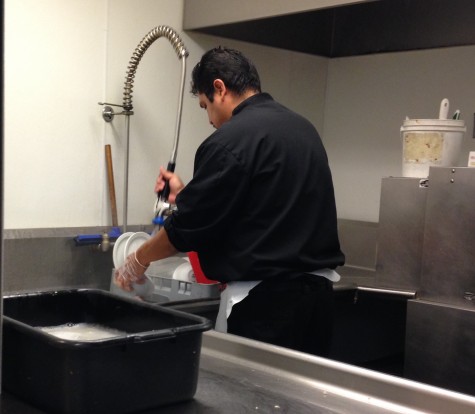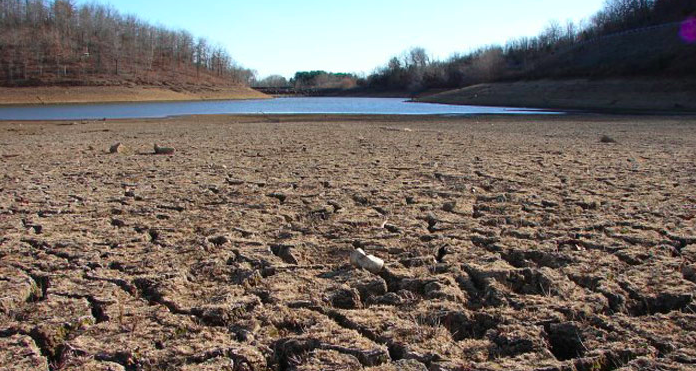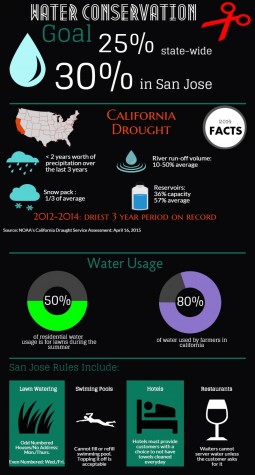California state government sets up new water regulations
Since 2012, California has been experiencing a drought that was small at first, but has caused water supplies to decrease over the years and forced Harker to cut water usage.
Just last week, Governor Jerry Brown authorized new regulations to conserve water
By commissioning the regulations on water use, the government strives to reduce water consumption by the urban population by 25 percent of 2013 usage in nine months. According to San Jose Water Company, Santa Clara Valley targets a 30 percent decrease from water consumption in 2013.
Harker has taught the student body to conserve water as much as possible throughout the years Students and faculty have even cut down water usage by watering the lawn less often or reducing the time in showers.
“This is maybe extreme, but maybe not. I take military showers, which is where you use cold water, you get wet, turn the water off while you lather and then you rinse with water back on,” Upper school English teacher Thomas Wicklund said. “So it easily cuts all of my showering water directly in half. I would estimate I use six to ten gallons less everyday by doing those two things alone.”

Upper School kitchen staff wash the dishes after lunch. The drought will result in water cuts all across Calfornia, including Harker.
The regulations are split into three areas, regulations for the entire state, mandatory water conservation, and local rules. People who violate these rules receive a fine of up to $500 for each rule broken.
In the statewide set of rules, the state encourages residents not to waste water. First, citizens cannot clean sidewalks and driveways with drinkable water or even wash a car with a hose without a nozzle that turns off itself. In fact, watering the lawn within 48 hours of rainfall is considered illegal with the new regulations. Outside of the rules regarding a person’s own property, restaurants will now not offer water without a request from the customer and hotel rooms must include a sign that allows an option for guests to not have towels cleaned everyday.
Students also provide their opinions about hotels providing an option to not have towels cleaned daily.
“I think it is a very good idea,” Kristen Park (11) said. “More options are always better. That also makes customers more aware of the problems we are having.”
Before the drought, restaurants often served water the moment customers were seated at the dining table. Now, customers must request water in order for waiters to serve it.
“I think asking for it is fine, because some people might want something else instead of water, so this might avoid wasting it,” Matthew Hu (10) said.
The majority of the student body has not made drastic changes to their lifestyle, but students who began to conserving water mainly reduce the amount they use to water their lawn.
“We stopped watering the lawn in the back of our house because nobody is really back there anyways, and we don’t need to waste water on that,” Jenna Sanders (9) said.
Since lawns dry up, students have found other methods to keep greenery in their house.
“We got plants in the house,” Kevin Xu (9) said. “Our grass is all dead and it makes our house look bad. The whole neighborhood all has yellow grass.”
The second set of guidelines involves mandatory restrictions and conservation in water usage. State Water Resources Control Board divided the 140 large cities, water companies and districts into nine different levels, depending on water consumption by each resident from last fall. They must meet their goals for reducing water usage, which are based from 2013 water usage, or the communities will have to pay a state fine up to $10,000 a day.
Cities that are already conserving water, such as Santa Clara, San Francisco and Hayward are only required to lower eight percent. Others that have heavier water consumption, such as Beverly Hills, Hillsborough and Bakersfield are obligated to reduce 36 percent of their water usage.
The third type of regulation covers local control, which can be checked with the water department in the area. For San Jose, one of the rule prevents residents with pools from filling it up, but topping it off is acceptable. Different houses are also designated a day to use the sprinkler before 10 a.m. and 8 pm. Odd numbered houses and properties without addresses are allowed to water their lawns on Mondays and Thursdays, and even numbered houses can water on Tuesdays and Fridays.
Wicklund restrains from wasting water by following a few regulations set up by San Jose Water Company.
Residents who use recycled and gray water are exempt from these rules.
See San Jose Water Company for more of San Jose local rules.

Jackie Gao (10) is in her second year on staff is a reporter of the Winged Post. Her favorite part of journalism is the ability to interact with various...


















![“[Building nerf blasters] became this outlet of creativity for me that hasn't been matched by anything else. The process [of] making a build complete to your desire is such a painstakingly difficult process, but I've had to learn from [the skills needed from] soldering to proper painting. There's so many different options for everything, if you think about it, it exists. The best part is [that] if it doesn't exist, you can build it yourself," Ishaan Parate said.](https://harkeraquila.com/wp-content/uploads/2022/08/DSC_8149-900x604.jpg)




![“When I came into high school, I was ready to be a follower. But DECA was a game changer for me. It helped me overcome my fear of public speaking, and it's played such a major role in who I've become today. To be able to successfully lead a chapter of 150 students, an officer team and be one of the upperclassmen I once really admired is something I'm [really] proud of,” Anvitha Tummala ('21) said.](https://harkeraquila.com/wp-content/uploads/2021/07/Screen-Shot-2021-07-25-at-9.50.05-AM-900x594.png)







![“I think getting up in the morning and having a sense of purpose [is exciting]. I think without a certain amount of drive, life is kind of obsolete and mundane, and I think having that every single day is what makes each day unique and kind of makes life exciting,” Neymika Jain (12) said.](https://harkeraquila.com/wp-content/uploads/2017/06/Screen-Shot-2017-06-03-at-4.54.16-PM.png)








![“My slogan is ‘slow feet, don’t eat, and I’m hungry.’ You need to run fast to get where you are–you aren't going to get those championships if you aren't fast,” Angel Cervantes (12) said. “I want to do well in school on my tests and in track and win championships for my team. I live by that, [and] I can do that anywhere: in the classroom or on the field.”](https://harkeraquila.com/wp-content/uploads/2018/06/DSC5146-900x601.jpg)
![“[Volleyball has] taught me how to fall correctly, and another thing it taught is that you don’t have to be the best at something to be good at it. If you just hit the ball in a smart way, then it still scores points and you’re good at it. You could be a background player and still make a much bigger impact on the team than you would think,” Anya Gert (’20) said.](https://harkeraquila.com/wp-content/uploads/2020/06/AnnaGert_JinTuan_HoHPhotoEdited-600x900.jpeg)

![“I'm not nearly there yet, but [my confidence has] definitely been getting better since I was pretty shy and timid coming into Harker my freshman year. I know that there's a lot of people that are really confident in what they do, and I really admire them. Everyone's so driven and that has really pushed me to kind of try to find my own place in high school and be more confident,” Alyssa Huang (’20) said.](https://harkeraquila.com/wp-content/uploads/2020/06/AlyssaHuang_EmilyChen_HoHPhoto-900x749.jpeg)




